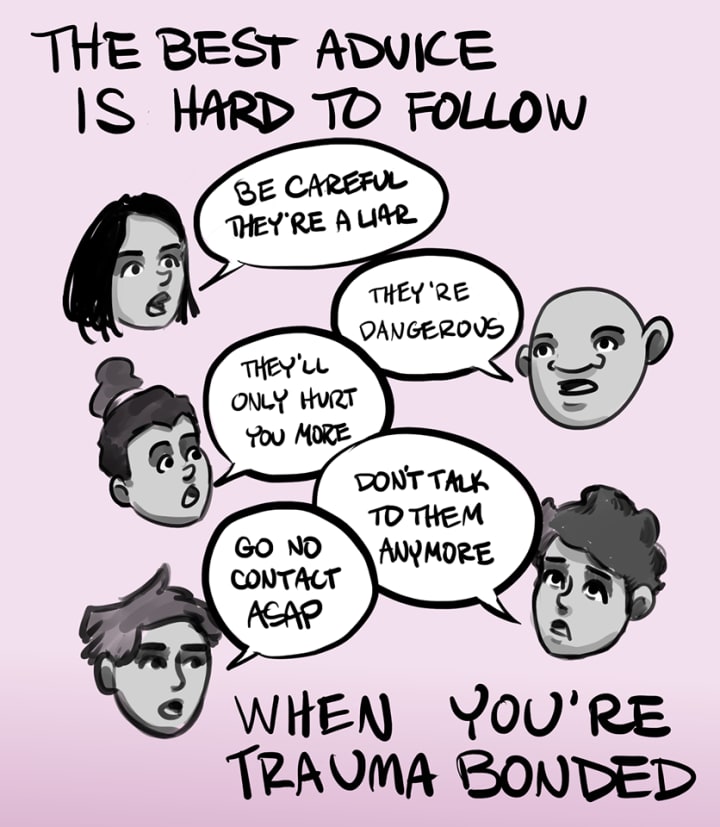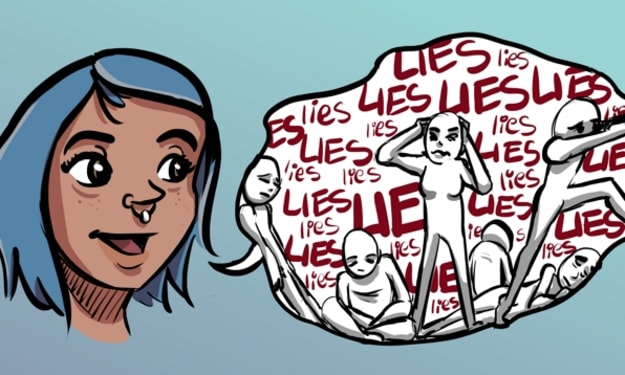
You may have a close friend or family member who is a serial abuser and not know it. It’s extremely common for abusers engaging in physical and/or psychological abuse to mask their activities by playing the victim. Would you be able to see through an abuser’s lies when they tell you their false version of events? How can you detect when someone is telling the truth about an abusive ex partner?
I ask this question to you as the survivor of an abusive relationship myself. I was psychologically abused for three years. My abuser employed behaviors such as gaslighting (to make me question my own sanity and blame myself for their abusive outbursts) and emotional manipulation (to make me hand over every spare dollar I earned). During our relationship, my abuser spread false rumors portraying me as abusive. My abuser would tell me she loved me and I was the best partner she’s ever had while telling her friends I was manipulative and controlling. Her false allegations of abuse isolated me from the truth and allowed her to cheat with multiple partners undetected for almost a year. After I separated from my abuser her accusations portraying me as an abuser only intensified. She’s falsely accused me of emotional manipulation, making suicidal threats, cheating, and more.
Abusers commonly pretend to be victims. It is their get out of jail free card. They can both get away with abuse and garner sympathy from friends; who can then be exploited further. It’s the final, and most damaging, blow an abuser makes against their victim. Abuse during a relationship is extremely traumatizing, but nothing is more harrowing to an abuse survivor than being labeled an abuser. The most sadistic phase of an abusive relationship is not the beginning or middle; it’s the end.
So, can you tell if your friend is telling the truth about their abusive ex? Are you certain your friend isn’t the real abuser? I’ve written some signs I look for based both on the research of others and my own personal experience. Please note that even if all of these signs apply to someone you know, it still isn’t a guarantee they are an abuser in disguise. Abusive personality traits don’t manifest the same in everyone, and not all survivors react to abuse in the same way. Some abusers are masters at playing the victim and will be skilled at avoiding these signs. There are also survivors who may display some of these signs whilst trying desperately to find help and understanding. Please be patient and do not be quick to judge someone who is trying to tell you their story. The best thing you can do for someone claiming to be the survivor of abuse is to listen closely and recommend they contact services specializing in domestic abuse.

A Trail of Destruction
Does this person have a long trail of destruction behind them? They might be a person who seems to hop between relationships with regularity. If you’ve known them long enough, you may see the same pattern repeating with all of their partners. Do they put their new partners on pedestals very quickly only for those same relationships to later crash and burn with stories of abuse and unfair treatment? Does it seem as though they have a story of abuse for every relationship they’ve been in? They may like to bring up stories of abusive exes to garner sympathy from you; just before asking for a favor or two.
The Big Three Lies
There are three major lies an abuser will make their abused partners believe. These lies are at the core of psychological manipulation that results in the abused partner struggling to understand what’s happening to them and unable to leave their abuser. Look for the following elements in the stories they tell you about their abusive ex.
1. Their Partner Made Them Angry
Abusers make their partner responsible for preventing their anger. This is to keep them on the defensive and cautious of provocation. It paints the abused partner as the problem-causer of the relationship and causes them to second guess themselves. It is never anyone’s responsibility to prevent another person from becoming angry. Outbursts of anger or rage are never acceptable, and the trauma caused by repeated outbursts is equal to the trauma caused by physical abuse.
An abuser will tell you stories about how angry their partner made them, and that their anger was justified by their partner’s actions. Conversely, an abused partner’s story will often stress how hard they worked to prevent their abuser’s anger.
2. Their Partner Failed To Keep Them Happy
An abuser manipulates their partner’s desire to make others happy. It’s the primary reason people-pleasers often find themselves the targets of abuse. The abuser will make their abused partner responsible for their happiness and mental health. An abused partner will tirelessly work to keep their abuser happy and become filled with guilt when they fail. Abusers will cycle between approval and disapproval of their abused partner’s attempts in order to keep them chasing the proverbial carrot.
An abuser will tell you stories about how their partner rarely or never measured up and couldn't keep them happy. An abused partner will tell you stories about how tirelessly they worked to keep their partner happy but it was just never enough.
3. Their Partner Was Responsible for Fixing the Relationship
Abusers tend to view relationships as transactions. They will only give if they feel they’ve received something that deserves a reward. Conversely, an abused partner generally sees relationships as a two-way street and will give freely without demands expecting that their partner will do the same. It’s common for an abuser to hold the relationship hostage until their partner gives them what they feel they deserve.
An abuser will tell you stories about warning their partner that they will end the relationship if they didn’t get their act together. The abuser’s ultimatums are often vague, but can sometimes have very specific criteria. A survivor will tell you about how they were forced to meet their partner’s frequent demands to keep the relationship alive.
Projection
The hallmark of an abuser is projection. They will accuse the abused partner of displaying the same behaviors they engage in. This most often takes place when they’re being confronted by, or making an excuse for, inappropriate behaviors. For example, if the abused partner is crying, the abuser may claim their partner is just faking it in order to manipulate them. If an abuser’s bank account is overdrawn due to irresponsible spending they may accuse their partner of not earning enough to support their lifestyle. Projection is all about deferring the blame for unacceptable behavior onto someone else.
An abuser’s stories about how their partner mistreated them may sound more like reflections of themselves. This is easier to pick up on if you’ve known this person for awhile and have witnessed their habits play out over time. If they tell you stories about their partner being financially irresponsible, it may remind you that they also have a history of financial problems. They may tell you that their partner is manipulating their emotions, but they also have a habit of coming to you with a sad stories asking for a favor or two. They may say their partner is always angry, but they also have a habit of getting angry with people online or at work. If a person’s stories of abuse seem to be a reflection of themselves they may be projecting.
They Have No Doubt
Many abusers will have no doubt that they were in the right. They’ll be able to recount their experiences with confidence. It may even appear as though they have prepared stories in advance.
When someone is the survivor of abuse they will often deeply struggle to understand and communicate what happened to them. While trying to explain the abuse, they may find themselves backtracking frequently and questioning their own actions. They may even wonder if they actually deserved the abuse and are overthinking what happened. They’ll often ruminate about various aspects of the relationship and wonder what they did wrong. They'll find great difficulty in giving you a confident answer. A survivor might also come to you with sudden new realizations about what happened to them. This is a normal part of coming to terms with and healing from abuse.
They’re Telling Everyone About It
The Abuser is trying to cover up what they did. They can’t just let someone who knows the truth tell their story unchallenged. Often, an abuser will already have a head start on their abused partner. They’ll have been spreading false rumors about their partner before the relationship has ended. When separation occurs people will have been well groomed to ignore any stories they hear about the abusive ex.
An abuse survivor will struggle to tell their story at all. More often than not, they’ve been reluctant to tell anyone that something is wrong. This is usually motivated by a hope that they can fix the relationship, and they don’t want to paint their partner in a bad light. They may also be reluctant to speak up because it could result in more abuse if their partner hears about it. Abused partners are frequently isolated by their abusers and may not have anyone they can trust with their story. When they do begin to tell their story, they’re often playing catch-up and will have to face the false rumors head on.
They Can’t Be Wrong
I don’t recommend questioning the story or actions of someone telling you their story of abuse. It can be very hurtful to apply skepticism to a person looking to you for help. However, if someone does have their story of abuse put into question, their reaction may be telling.
Many abusers will react with anger if you apply skepticism to their story. They will be unwilling to reflect on the validity of their actions and will attempt to make you feel guilty for trying. They may also gaslight you by acting as though your question doesn’t make sense or isn’t valid. When pushed for details they may have some readily available answers but will quickly become annoyed or dismissive if they do not. If you remain unconvinced they will likely become angry and give up trying to explain anything to you.
An abused partner will often be too willing to question themselves. They’re still searching for answers to explain what happened and will be open to input. They may also react with desperation or sadness if their story is called into question. Imagine looking for help and being unable to find it because nobody will believe you. A survivor has a desire to be heard and not feel alone. They’re looking for answers and aren’t trying to bully you into believing them over someone else. When pressed for more details they may think hard on their answers and may begin to doubt themselves. If you remain unconvinced they will likely make additional attempts to explain what happened with more clarity.

Thank you for reading. Please remember that these signs are not a guarantee of someone’s guilt or innocence. Even professionals can have a hard time identifying an abuser. Abusers become more proficient at hiding their behavior with every new relationship. If someone is telling you they are in an abusive relationship, or suspect you are in one yourself, please reach out to a service specializing in domestic abuse. They will be more qualified to assist you than I am.
About the Creator
Reader insights
Outstanding
Excellent work. Looking forward to reading more!
Top insight
Heartfelt and relatable
The story invoked strong personal emotions






Comments
There are no comments for this story
Be the first to respond and start the conversation.